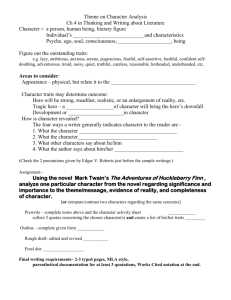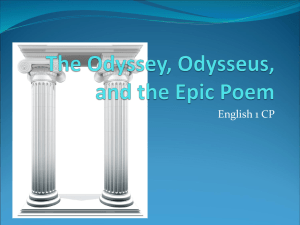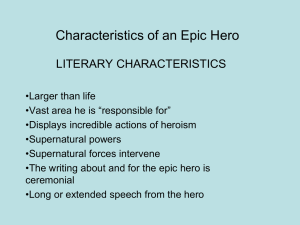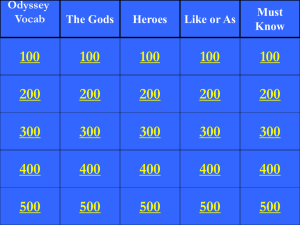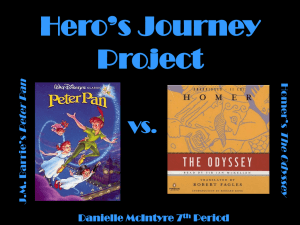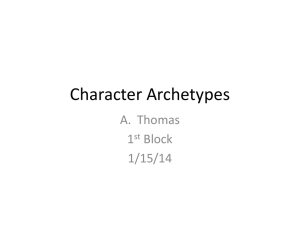Journal assignment
advertisement
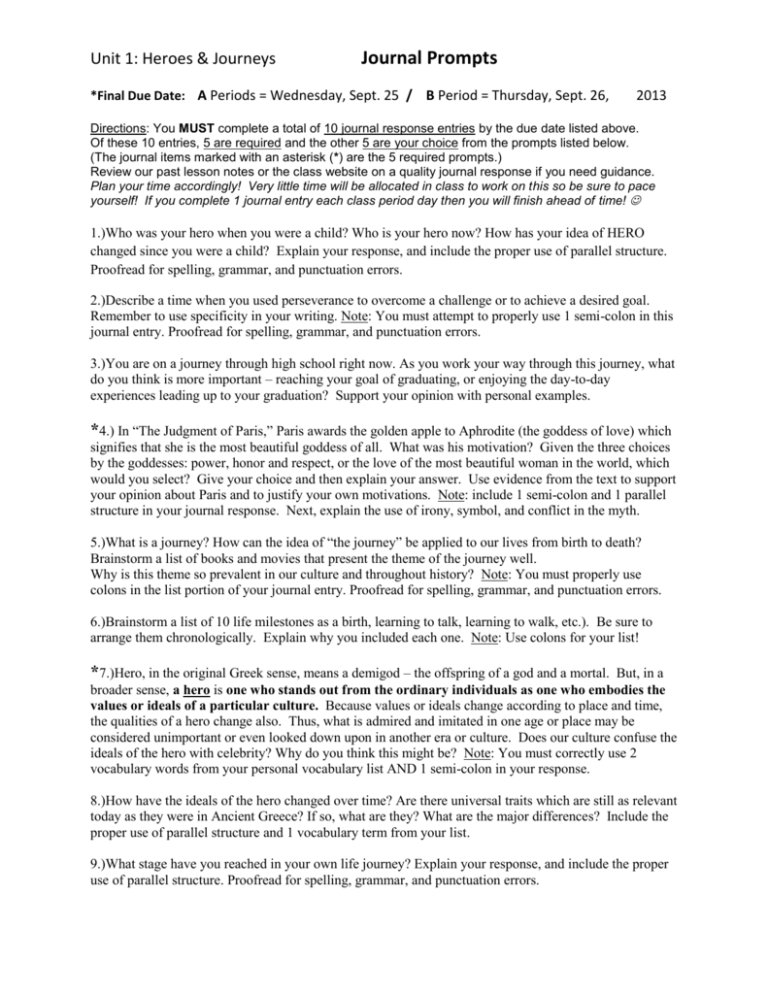
Unit 1: Heroes & Journeys Journal Prompts *Final Due Date: A Periods = Wednesday, Sept. 25 / B Period = Thursday, Sept. 26, 2013 Directions: You MUST complete a total of 10 journal response entries by the due date listed above. Of these 10 entries, 5 are required and the other 5 are your choice from the prompts listed below. (The journal items marked with an asterisk (*) are the 5 required prompts.) Review our past lesson notes or the class website on a quality journal response if you need guidance. Plan your time accordingly! Very little time will be allocated in class to work on this so be sure to pace yourself! If you complete 1 journal entry each class period day then you will finish ahead of time! 1.)Who was your hero when you were a child? Who is your hero now? How has your idea of HERO changed since you were a child? Explain your response, and include the proper use of parallel structure. Proofread for spelling, grammar, and punctuation errors. 2.)Describe a time when you used perseverance to overcome a challenge or to achieve a desired goal. Remember to use specificity in your writing. Note: You must attempt to properly use 1 semi-colon in this journal entry. Proofread for spelling, grammar, and punctuation errors. 3.)You are on a journey through high school right now. As you work your way through this journey, what do you think is more important – reaching your goal of graduating, or enjoying the day-to-day experiences leading up to your graduation? Support your opinion with personal examples. *4.) In “The Judgment of Paris,” Paris awards the golden apple to Aphrodite (the goddess of love) which signifies that she is the most beautiful goddess of all. What was his motivation? Given the three choices by the goddesses: power, honor and respect, or the love of the most beautiful woman in the world, which would you select? Give your choice and then explain your answer. Use evidence from the text to support your opinion about Paris and to justify your own motivations. Note: include 1 semi-colon and 1 parallel structure in your journal response. Next, explain the use of irony, symbol, and conflict in the myth. 5.)What is a journey? How can the idea of “the journey” be applied to our lives from birth to death? Brainstorm a list of books and movies that present the theme of the journey well. Why is this theme so prevalent in our culture and throughout history? Note: You must properly use colons in the list portion of your journal entry. Proofread for spelling, grammar, and punctuation errors. 6.)Brainstorm a list of 10 life milestones as a birth, learning to talk, learning to walk, etc.). Be sure to arrange them chronologically. Explain why you included each one. Note: Use colons for your list! *7.)Hero, in the original Greek sense, means a demigod – the offspring of a god and a mortal. But, in a broader sense, a hero is one who stands out from the ordinary individuals as one who embodies the values or ideals of a particular culture. Because values or ideals change according to place and time, the qualities of a hero change also. Thus, what is admired and imitated in one age or place may be considered unimportant or even looked down upon in another era or culture. Does our culture confuse the ideals of the hero with celebrity? Why do you think this might be? Note: You must correctly use 2 vocabulary words from your personal vocabulary list AND 1 semi-colon in your response. 8.)How have the ideals of the hero changed over time? Are there universal traits which are still as relevant today as they were in Ancient Greece? If so, what are they? What are the major differences? Include the proper use of parallel structure and 1 vocabulary term from your list. 9.)What stage have you reached in your own life journey? Explain your response, and include the proper use of parallel structure. Proofread for spelling, grammar, and punctuation errors. 10.) “The Odyssey” is, at its most basic, the story of one man’s journey home. What does HOME mean to you? Is it merely a place, or does the term have deeper meaning? Explain your answer. Include the proper use of parallel structure and 1 vocabulary term from your list. 11.)Both Odysseus and Calypso use flattery to try to get what they want from the other in this scene. Do you think flattery is a powerful weapon? Why or why not? 12.)In addition to flattery, what other strategies does Calypso use to try to convince Odysseus to stay with her? In light of Calypso’s pleading, why does Odysseus still decide to leave? Be sure to select 5 of your vocabulary terms you have written in your list. Use them correctly in a welldeveloped paragraph in your journal response. Underline each new word. It is acceptable to change the part of speech of a new word as long as you can show comprehension. *13.)How does Polyphemus break the laws of hospitality? Is he justified in his anger and his actions? Explain your answer. Be sure to use at least two examples of parallel structure in your journal. After you finish your response, revisit the text, asking questions and taking notes on difficult passages, and annotating new vocabulary in your Holt Adapted Reader. Be sure to add these words to your personal vocabulary list. *14.)Every hero has what is known as a Tragic Flaw – that quality which, if unchecked, will lead to the hero’s death or destruction, or to the death or destruction of those around him. What do you think Odysseus’s Tragic Flaw is? How have you seen this flaw manifest itself, especially in the “The Cyclops?” 15.) “Circe,” and “Land of the Dead:” - How are Circe’s motivations in direct contrast with those of Odysseus? - Circe, a witch, has magical powers that she uses to control the men who come to her island. How does Odysseus avoid this fate? - Discuss Odysseus’s motivation to travel to see Tieresias in the Underworld 16.)“The Sirens” and “Scylla and Charybdis:” These two scenes truly underscore Odysseus as a hero with a tragic flaw. Identify specific evidence from each story listed above that demonstrates Odysseus to be a hero trying to get his men home safely. How does his tragic flaw impact each story? Are there other influences at play that affect the outcomes? Refer to your notes on Joseph Campbell’s Hero’s Journey, and the archetype of the hero in your response. 17.)After reading “The Sirens,” imagine that you are a movie director, assigned the task of producing a modern take on the tale of the Sirens. A. Where would you set your film? B. How would the setting impact the story? C. What would your monster-character look like? Why do you imagine him or her as such? D. How would the monster lure in the victims? E. How would your hero prepare for/react to the danger? 18.)PRE-Journal to “Death at the Palace:” By all accounts, Odysseus should not be successful in his campaign to defeat the suitors due to their sheer numbers. However, Odysseus has “cunning.” He also has the aid of several gods and goddesses. Predict what will happen in this scene, based on your knowledge of Joseph Campbell’s Hero’s Journey, and the archetype of the hero. *19.)In “Death at the Palace:” Paraphrase Odysseus’s speech in lines 34- 40: “You yellow dogs, you thought I’d never make it / home from the land of Troy. You took my house to plunder,twisted my maids to serve your beds. You dared / bid for my wife while I was still alive. Contempt was all you had for the gods who rule wide heaven,/ Contempt for what mean say of you hereafter. Your last hour has come. Now you die in blood.” -Submit your paraphrased lines as a Journal entry 20.) “Odysseus & Penelope:” Assume that Odysseus represents the ancient Greeks’ ideal of a man and that Penelope represents their ideal of a woman. In what ways are the characters similar to and different from the ideal man and woman today? Refer to your notes on Joseph Campbell’s Hero’s Journey, and the archetype of the hero in your response.



